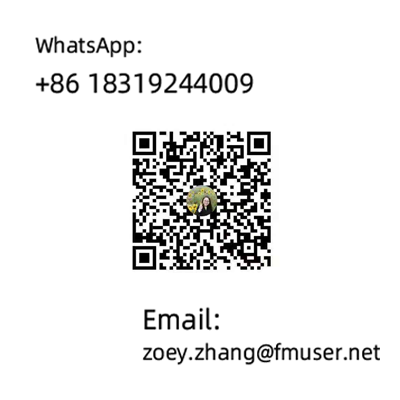Products Category
- FM Transmitter
- 0-50w 50w-1000w 2kw-10kw 10kw+
- TV Transmitter
- 0-50w 50-1kw 2kw-10kw
- FM Antenna
- TV Antenna
- Antenna Accessory
- Cable Connector Power Splitter Dummy Load
- RF Transistor
- Power Supply
- Audio Equipments
- DTV Front End Equipment
- Link System
- STL system Microwave Link system
- FM Radio
- Power Meter
- Other Products
- Special for Coronavirus
Products Tags
Fmuser Sites
- es.fmuser.net
- it.fmuser.net
- fr.fmuser.net
- de.fmuser.net
- af.fmuser.net ->Afrikaans
- sq.fmuser.net ->Albanian
- ar.fmuser.net ->Arabic
- hy.fmuser.net ->Armenian
- az.fmuser.net ->Azerbaijani
- eu.fmuser.net ->Basque
- be.fmuser.net ->Belarusian
- bg.fmuser.net ->Bulgarian
- ca.fmuser.net ->Catalan
- zh-CN.fmuser.net ->Chinese (Simplified)
- zh-TW.fmuser.net ->Chinese (Traditional)
- hr.fmuser.net ->Croatian
- cs.fmuser.net ->Czech
- da.fmuser.net ->Danish
- nl.fmuser.net ->Dutch
- et.fmuser.net ->Estonian
- tl.fmuser.net ->Filipino
- fi.fmuser.net ->Finnish
- fr.fmuser.net ->French
- gl.fmuser.net ->Galician
- ka.fmuser.net ->Georgian
- de.fmuser.net ->German
- el.fmuser.net ->Greek
- ht.fmuser.net ->Haitian Creole
- iw.fmuser.net ->Hebrew
- hi.fmuser.net ->Hindi
- hu.fmuser.net ->Hungarian
- is.fmuser.net ->Icelandic
- id.fmuser.net ->Indonesian
- ga.fmuser.net ->Irish
- it.fmuser.net ->Italian
- ja.fmuser.net ->Japanese
- ko.fmuser.net ->Korean
- lv.fmuser.net ->Latvian
- lt.fmuser.net ->Lithuanian
- mk.fmuser.net ->Macedonian
- ms.fmuser.net ->Malay
- mt.fmuser.net ->Maltese
- no.fmuser.net ->Norwegian
- fa.fmuser.net ->Persian
- pl.fmuser.net ->Polish
- pt.fmuser.net ->Portuguese
- ro.fmuser.net ->Romanian
- ru.fmuser.net ->Russian
- sr.fmuser.net ->Serbian
- sk.fmuser.net ->Slovak
- sl.fmuser.net ->Slovenian
- es.fmuser.net ->Spanish
- sw.fmuser.net ->Swahili
- sv.fmuser.net ->Swedish
- th.fmuser.net ->Thai
- tr.fmuser.net ->Turkish
- uk.fmuser.net ->Ukrainian
- ur.fmuser.net ->Urdu
- vi.fmuser.net ->Vietnamese
- cy.fmuser.net ->Welsh
- yi.fmuser.net ->Yiddish
How to Build Two Meter Ham Radio Equipment
Date:2014/11/25 15:12:49 Hits:
Ham radio, or amateur radio, is the use of radio frequencies known as “Amateur Bands” for private recreation, emergency communication and non-commercial exchange of information. Ham radio is used by students, doctors, truck drivers, celebrities, missionaries and non-profit organizations. The 2 meter band that ranges from 144 to 14 megahertz is the most popular ham band and uses FM transmission. Before you build any ham radio equipment and get on air, you must get an amateur radio license from the Federal Communications Commission. A 2-meter ham radio station consists of a small transceiver, a power supply, swr/power meter, coax leading outside to the antenna. You may buy these parts or build some of them to match
Things You'll Need
Plan for the antenna
Transceiver kit
Power source
Instructions
1.Build your own ham radio equipment for the right reason. You can buy all the parts required to start a 2 meter ham radio station at a cheap price. There are several user-friendly, ready to use antennas and transceivers that range between $500 to $1000. In fact, building your own equipment can sometimes be more expensive and will consume a significant amount of your time. Start the project only if you are in it for the love of electronics, and as with any project, determine your budget before starting it.
2.Choose the type of antenna you want to build. There are hundreds of antenna designs available online and in ham radio books. The design of your antenna depends on the type of operation, available real estate, supports and safety. Most 2-meter FM transmissions work best with vertically polarized antenna. They are easy to build and maintain, and since the 2-meter band is a high frequency band, a small antenna can achieve high gain, even in city limits. Choose an antenna design for which components are easily available.
3.Build a transceiver that covers the 2-meter ham band. You can use transceiver kits available online or build from scratch. As with the antenna, there are several different types of transceivers on the market. Your transceiver can be a small, low-powered hand-held device, especially if money is a constraint. These are usually operated by an internal battery. More powerful models require an external power supply or a car battery.
4.Calculate the voltage requirement and current consumption of your equipment and design a power supply accordingly. Most mobile radios require 12 to 15 volts of DC power, and it is better to get a power supply that has 25 to 50 percent more output than what is required by your equipment.
Tips & Warnings
There are hundreds of ways to build ham radio equipment. Choose your design carefully.
Seek professional help if you are not sure of the requirements for your equipment. You may also purchase the antenna, transceiver and other equipment.
Make sure all the connections of your 2-meter ham radio station are connected properly and all the wires are secure. Safety should be your first priority.
Leave a message
Message List
Comments Loading...





